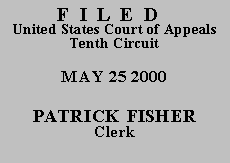

| UNITED STATES OF AMERICA, |
|
| v. | |
| RONALD KIRK MERKELEY,
Defendant-Appellant. |
Mr. Merkeley filed a pro se motion to vacate or set aside his sentence pursuant to 28 U.S.C. § 2255, alleging that his conviction under 18 U.S.C. § 924(c)(1) is invalid in light of the Supreme Court's holding in Bailey v. United States, 516 U.S. 137 (1995). In Bailey, the Supreme Court narrowed the proper construction of "use" of a firearm under § 924(c)(1). Mr. Merkeley contends his guilty plea was not knowing and voluntary because he entered it prior to Bailey.
The district court, adopting the recommendation and report of the magistrate judge, denied the petition for habeas relief. The court found Mr. Merkeley's claim was procedurally barred and he could not establish either 1) cause and prejudice, or 2) actual innocence. As to cause and prejudice, the district court applied Bousley v. United States, 118 S. Ct. 1604 (1998). Bousley expressly rejected the contention that the unavailability of the Supreme Court's opinion in Bailey established cause for defaulting a claim for a narrower construction of "use" under § 924(c)(1). See id. at 1611. The district court therefore concluded Mr. Merkeley had not established cause for his failure to raise the "use" issue prior to his § 2255 petition.
The district court then noted that Mr. Merkeley is required to establish actual innocence to both the "use" and "carry" prongs under § 924(c)(1), and any other charges the government did not pursue as a result of the plea negotiations. See id. at 1611-12. The court found Mr. Merkeley could not establish actual innocence on the "carry" prong of § 924(c)(1), or on the other charges brought against him that the government dropped pursuant to the plea agreement.
The legal analysis and findings of the district court are thorough and sound. Accordingly, we AFFIRM denial of the petition for habeas for substantially the same reasons as the district court.(1)
Entered for the Court,
Robert H. Henry
Circuit Judge
*. This order and judgment is not binding precedent, except under the doctrines of law of the case, res judicata, and collateral estoppel. The court generally disfavors the citation of orders and judgments; nevertheless, an order and judgment may be cited under the terms and conditions of 10th Cir. R. 36.3.
**. After examining the briefs and appellate record, this panel has determined unanimously that oral argument would not materially assist the determination of this appeal. See Fed. R. App. P. 34(a)(2); 10th Cir. R. 34.1(G). The case is, therefore, ordered submitted without oral argument.
1.Mr. Merkeley also contends he is entitled to an evidentiary hearing on his claim. Under 28 U.S.C. § 2255, the district court is required to conduct an evidentiary hearing "[u]nless the motion and the files and records of the case conclusively show that the prisoner is entitled to no relief." Here, we believe the record conclusively shows Mr. Merkeley is not entitled to any relief under § 2255.